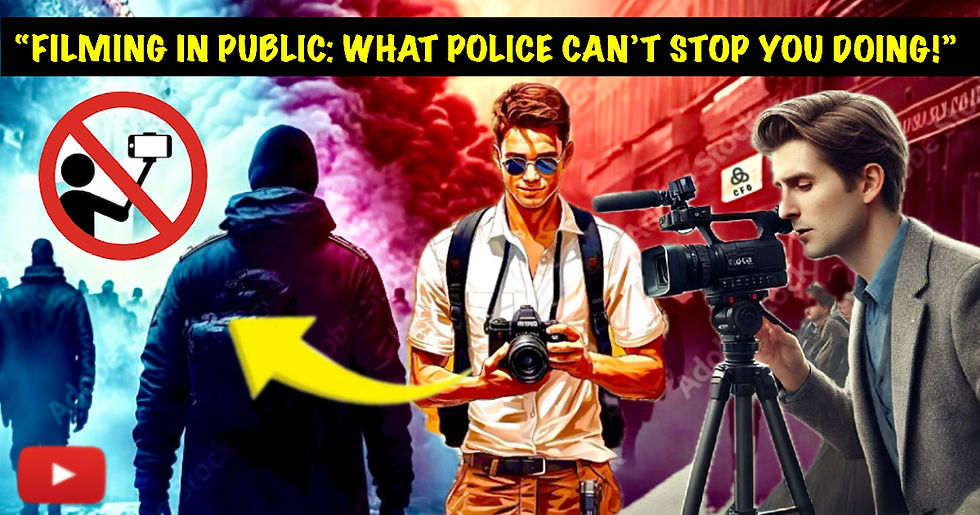Op-Ed: The Truth About Filming in Public—Dispelling the Myths and Understanding Your Rights
By Ben Freeman

There is a peculiar affliction in modern Britain: an epidemic of misinformation about the law on filming in public. From overzealous security guards barking orders they have no authority to give, to well-meaning but misguided members of the public convinced that filming children is automatically illegal, the level of confusion is staggering.
Let’s be clear: the law is not vague. It is not “open to interpretation.” And it certainly does not operate on the whims of the uninformed. Today, we set the record straight.
The Legal Reality—Filming in Public is a Right, Not a Privilege
In the UK, there is no law prohibiting the filming of people, places, or events in public spaces. This principle is enshrined in law, reaffirmed in police guidance, and upheld by the courts. Whether you are a professional journalist, a documentary filmmaker, or simply an individual with a smartphone, the law treats you the same: you do not need permission to film in public.
Yet despite this legal clarity, myths persist. Let’s dismantle them one by one.
MYTH #1: "The Police Can Stop You from Filming—or Delete Your Footage"
There is an enduring misconception that police officers have the power to prevent members of the public or the press from filming, especially when officers themselves are the subject of that footage. Some even believe that the police can legally demand the deletion of images or video.
This is completely false.
The Association of Chief Police Officers (ACPO) guidance on this issue is unequivocal:
There are no powers prohibiting the taking of photographs or filming in public places.
The police have no power to delete images or confiscate footage without a court order.
To be clear, an officer cannot simply demand that you stop filming because they find it inconvenient, uncomfortable, or embarrassing. The only legal grounds upon which an officer may interfere with filming would be under specific counter-terrorism laws (e.g., Section 43 of the Terrorism Act 2000), but even then, their powers are narrow and limited to situations where they have reasonable suspicion that the footage is being taken for terrorist purposes.
For everything else? The camera keeps rolling.
MYTH #2: "You Need Permission to Film in Public"
A popular misconception—often peddled by misinformed security guards—is that filming in public requires some form of “permit” or “authorisation.” This is utter nonsense.
The law is straightforward: if you are in a public space, you are free to film.
The only places where filming restrictions apply are:
Private property (shopping centres, office buildings, private land, etc.), where the property owner sets the rules.
Certain designated areas under specific laws (e.g., some military bases or court premises while proceedings are ongoing).
However, standing on a public pavement, filming a building or event, is entirely lawful, no matter how much a security guard may protest. Their jurisdiction ends where public land begins.
The next time someone insists you need permission to film in a public park, a street, or a town square, kindly direct them to the concept of reality.
MYTH #3: "It’s Illegal to Film Minors in Public Because of Child Protection Laws"
This myth is one of the most persistent, and it’s easy to see why. The phrase “child protection laws” is often thrown around with an air of authority, as if it automatically renders all filming of minors unlawful. It does not.
The truth is simple: age is not a factor in the right to film in public. There is no law in the UK that prohibits filming minors in a public place.
This, of course, does not mean that all filming of children is automatically appropriate. If the footage is being taken for illegal or sinister purposes—such as harassment, stalking, or exploitation—then it crosses the threshold into criminal behaviour. But the act of filming itself? Perfectly legal.
A classic example of this misconception in action is the irate parent who confronts a journalist at a public event, insisting that their child’s presence in a news report is “against the law.” It is not. While it is understandable that some people may feel uncomfortable with their children being filmed, discomfort does not equate to illegality.
Why This Matters
The misinformation surrounding public filming is not just an academic concern—it has real-world consequences. Journalists are harassed. Citizens are wrongly told to stop recording. Police officers occasionally overstep their authority due to a misunderstanding of the law.
This confusion ultimately erodes public confidence in both law enforcement and media freedoms. It creates unnecessary confrontations and, in some cases, leads to unlawful interference with lawful activities.
The ACPO guidance could not be clearer: restricting photography or filming “undermines public confidence in the police service.” And yet, the myths persist.
So, let’s set the record straight:
You do not need permission to film in public.
The police cannot stop you from filming unless very specific legal conditions are met.
Your footage cannot be deleted or confiscated without a court order.
Filming minors in public is not illegal.
These are the facts. And in an era of misinformation, knowing your rights is the first step in protecting them.
Final Thoughts
The right to film in public is fundamental. It is the mechanism by which wrongdoing is exposed, accountability is upheld, and history is documented.
So the next time someone tells you to stop filming, ask them one simple question: “Which law am I breaking?”
Watch how quickly they change the subject.
Well, that’s all for now. But until our next article, please stay tuned, stay informed, but most of all, stay safe. And I’ll see you then.
Bénédict Tarot Freeman
Editor-at-Large
Video Production News, City-Desk

Comments